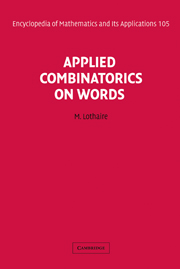Book contents
- Frontmatter
- Contents
- Preface
- Chapter 1 Algorithms on Words
- Chapter 2 Structures for Indexes
- Chapter 3 Symbolic Natural Language Processing
- Chapter 4 Statistical Natural Language Processing
- Chapter 5 Inference of Network Expressions
- Chapter 6 Statistics on Words with Applications to Biological Sequences
- Chapter 7 Analytic Approach to Pattern Matching
- Chapter 8 Periodic Structures in Words
- Chapter 9 Counting, Coding, and Sampling with Words
- Chapter 10 Words in Number Theory
- References
- General Index
Chapter 10 - Words in Number Theory
Published online by Cambridge University Press: 05 June 2013
- Frontmatter
- Contents
- Preface
- Chapter 1 Algorithms on Words
- Chapter 2 Structures for Indexes
- Chapter 3 Symbolic Natural Language Processing
- Chapter 4 Statistical Natural Language Processing
- Chapter 5 Inference of Network Expressions
- Chapter 6 Statistics on Words with Applications to Biological Sequences
- Chapter 7 Analytic Approach to Pattern Matching
- Chapter 8 Periodic Structures in Words
- Chapter 9 Counting, Coding, and Sampling with Words
- Chapter 10 Words in Number Theory
- References
- General Index
Summary
Introduction
This chapter shows some examples of applications of combinatorics on words to number theory with a brief incursion into physics. These examples have a common feature: the notion of morphism of the free monoid. Such morphisms have been widely studied in combinatorics on words; they generate infinite words which can be considered as highly ordered, and which occur in an ubiquitous way in mathematics, theoretical computer science, and theoretical physics.
The first part of this chapter is devoted to the notion of automatic sequences and uniform morphisms, in connection with the transcendence of formal power series with coefficients in a finite field. Namely it is possible to characterize algebraicity of these series in a simple way: a formal power series is algebraic if and only if the sequence of its coefficients is automatic, that is, if it is the image by a letter-to-letter map of a fixed point of a uniform morphism. This criterion is known as Christol's theorem. A central tool in the study of automatic sequences is the notion of kernel of an infinite word (sequence) over a finite alphabet: this is the set of subsequences obtained by certain decimations. A rephrasing of Christol's theorem is that transcendence of a formal power series over a finite field is equivalent to infiniteness of the kernel of the sequence of its coefficients: this will be illustrated in this chapter.
- Type
- Chapter
- Information
- Applied Combinatorics on Words , pp. 520 - 578Publisher: Cambridge University PressPrint publication year: 2005
- 1
- Cited by



